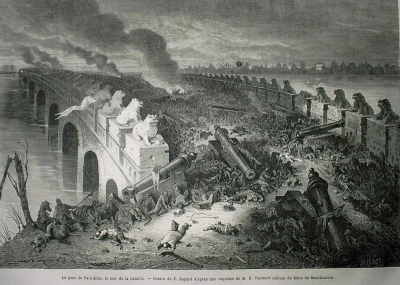The Treaty of Tientsin, also known as the Treaty of Tianjin, is a collective name for several documents signed at Tianjin (then romanized as Tientsin) in June 1858. The Qing dynasty, Russian Empire, Second French Empire, United Kingdom, and the United States were the parties involved. These treaties, counted by the Chinese among the so-called unequal treaties, opened more Chinese ports to foreign trade, permitted foreign legations in the Chinese capital Beijing, allowed Christian missionary activity, and effectively legalized the import of opium. They ended the first phase of the Second Opium War, which had begun in 1856 and were ratified by the Emperor of China in the Convention of Peking in 1860, after the end of the war.
The Second Opium War (Chinese: 第二次鴉片戰爭; pinyin: Dì'èrcì Yāpiàn Zhànzhēng), also known as the Second Anglo-Chinese War, the Second China War, the Arrow War, or the Anglo-French expedition to China, was a war pitting the British Empire and the French Empire against the Qing dynasty of China that lasted from 1856 to 1860.
In 1860, British and French troops landed near Beijing and fought their way into the city. Negotiations quickly broke down and the British High Commissioner to China ordered the troops to loot and destroy the Imperial Summer Palace, a complex and garden where Qing Dynasty emperors had traditionally handled the country’s official matters.
The second Opium War forced the Qing government to sign peace treaties between China and Russia such Tianjin Treaty and Beijing Treaty. As a result, China lost more than 1.5 million square kilometers of territory in northeast and northwest China. After the war, the Qing government was able to concentrate on the Taiping Rebellion and maintaining its rule. The agreements of the Convention of Peking led to the ceding of Kowloon Peninsula as part of Hong Kong.
It was the second major war in the Opium Wars, fought over issues relating to the exportation of opium to China, and resulted in a second defeat for the Qing dynasty. The war caused many Chinese officials to believe that conflicts with the Western powers were no longer traditional affairs, but part of a looming national crisis.

1860Oct, 18
The Second Opium War finally ends at the Convention of Peking with the ratification of the Treaty of Tientsin, an unequal treaty.
Choose Another Date
Events on 1860
- 27May
Italian unification
Giuseppe Garibaldi begins his attack on Palermo, Sicily, as part of the Italian unification. - 7Sep
Giuseppe Garibaldi
Italian unification: Giuseppe Garibaldi enters Naples. - 20Sep
Edward VII of the United Kingdom
The Prince of Wales (later King Edward VII of the United Kingdom) visits Canada and the United States. - 8Oct
San Francisco
Telegraph line between Los Angeles and San Francisco opens. - 26Oct
Giuseppe Garibaldi
Meeting of Teano. Giuseppe Garibaldi, conqueror of the Kingdom of the Two Sicilies, gives it to King Victor Emmanuel II of Italy.

 English
English  español
español  français
français  português
português  русский
русский  العربية
العربية  简体中文
简体中文 